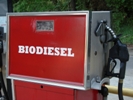Pluscrates switches to environmentally friendly bio-diesel made from waste cooking oil to power Bristol van fleet.
When crate rental company Pluscrates moved into their new depot in Bristol recently they were surprised to find one of the local removers, McKeown Business Moves, was also in the bio-diesel business, refining their own fuel from waste cooking oil. McKeown Bio Fuels was formed in 2007 and is now a well established fuel manufacturing business.
As a supplier of environmentally friendly products Pluscrates were keen to find out more and soon became one of McKeown’s newest customers. Pluscrates’ Managing Director John Mitchell said, “What McKeown’s are doing is very smart indeed. Running our local fleet on their bio-diesel, refined and sold locally, fits perfectly with our efforts to reduce our carbon footprint and at the same time we save money on our fuel bills. At the moment bio-diesel is around 15% cheaper than conventional petroleum-based diesel bought at forecourt prices and has less impact on the environment.”
McKeown Bio Fuels operate a fleet of vehicles all running on self-produced bio-diesel that collect waste cooking oil every day from local restaurants. The waste oil is filtered and then refined into pure bio-diesel. The process is relatively simple introducing a catalyst to the raw material which yields two products: 80-90% bio-diesel for use in diesel engines and 10-20% glycerine which McKeown use as a heating fuel in their workshops and warehousing.
At first John Mitchell was a little sceptical about using diesel made from old cooking oil, but when he discovered director Julian McKeowan used it in his new Range Rover Sport he was convinced.
Julian said, “We began making bio-diesel for our own fleet at McKeown Business Moves four years ago then, as we grew in reputation and scale, we began to see the opportunity to provide fuel to local businesses and the public. Switching to bio-diesel removes a deposit left by mineral diesel fuel which typically means changing the fuel filter after the first tank or two of bio has been used. Beyond that there is no other modification required to run bio-diesel.”
Bio-diesel reduces the emission of particulates by as much as 65% and is a possible candidate to replace fossil fuels as the world's primary transport energy source.
